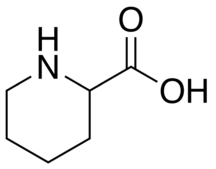Pipecolic acid
 | |
| Names | |
|---|---|
| IUPAC name
piperidine-2-carboxylic acid | |
| Identifiers | |
| 3105-95-1 | |
| 3D model (Jmol) | Interactive image |
| ChEBI | CHEBI:17964 |
| ChemSpider | 826 |
| ECHA InfoCard | 100.019.511 |
| EC Number | 217-024-4 |
| KEGG | C00408 |
| MeSH | C031345 |
| PubChem | 849 |
| |
| |
| Properties | |
| C6H11NO2 | |
| Molar mass | 129.15704 |
| Except where otherwise noted, data are given for materials in their standard state (at 25 °C [77 °F], 100 kPa). | |
| | |
| Infobox references | |
Pipecolic acid (piperidine-2-carboxylic acid) is a small organic molecule which accumulates in pipecolic acidemia. It is the carboxylic acid of piperidine.
Biochemical effects
It can be associated with some forms of epilepsy.[1]
CRYM, a taxon-specific crystallin protein that also binds thyroid hormones, is involved in the pipecolic acid pathway.
Environmental abundance and relevance
Pipecolic acid was identified in the Murchison meteorite.[2]
Stereochemistry
Pipecolic acid, like many other α-amino acids, has a chiral stereocenter at the α carbon.
References
- ↑ Plecko B, Hikel C, Korenke GC, et al. (2005). "Pipecolic acid as a diagnostic marker of pyridoxine-dependent epilepsy". Neuropediatrics. 36 (3): 200–5. doi:10.1055/s-2005-865727. PMID 15944906.
- ↑ Kvenholden, Keith A.; Lawless, James G.; Ponnamperuma, Cyril (February 1971). "Nonprotein Amino Acids in the Murchison Meteorite". Proceedings of the National Academy of Sciences. 68 (2): 486–490. doi:10.1073/pnas.68.2.486. PMC 388966
 . PMID 16591908.
. PMID 16591908.
See also
This article is issued from Wikipedia - version of the 8/2/2016. The text is available under the Creative Commons Attribution/Share Alike but additional terms may apply for the media files.